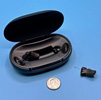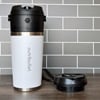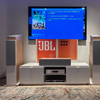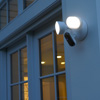Nearly 40 million American that could and should use hearing aids don’t because of prohibitive pricing and insurance. This week's FDA pronouncement that hearing aids would now be available to purchase over the counter (OTC) rather than via prescription from an audiologist is already resulting in new lower-priced hearing aid options.
But OTC hearing aids are more than just better hearing for less money. Thanks to new Bluetooth LE technology, combined with the competitive zeal and technical know-how of mainstream headphone/earbud makers such as Sony, Jabra, and Nuheara, OTC hearing aids are poised to turn into a hearing revolution.
First, what exactly are OTC hearing aids?
According to the FDA, OTC hearing aids represent a new category of hearing aid designed to help those with mild to moderate hearing loss. In short, OTC hearing aids amplify specific frequencies of sounds, primarily those for voices, to improve conversation and TV/movie dialog comprehension.
FDA's new regulations define two types of OTC hearing aids:
- Exempt: OTC hearing aids are only registered, not cleared, with the FDA as a medical device meeting manufacturing, product specification, safety, and labeling requirements. Many legacy "OTC hearing aid" products will fall under this category. "Exempt" products won't include user-specific frequency settings or meet hearing loss testing requirements but will include subjective tuning or presets to let you choose settings that suit you.
- Self-Fitting: Likely labeled as "FDA cleared," these hearing aids are more sophisticated and expensive than "exempt." They fall under the FDA's 510(k) regulations, meaning they are premarket cleared to be safe and effective for mild-to-moderate hearing loss and include frequency-specific customization and hearing testing for each ear to match your actual hearing profile or loss automatically.
OTC hearing aids shouldn't be confused with so-called Personal Sound Amplification Products (PSAPs) or "hearables," which simply boost all sound levels and are not specifically designed to compensate for hearing loss.
The whole idea behind OTC hearing aids is to lower their cost. Audiologist-tuned hearing aids can cost $2,000-$10,000, two-thirds of which pays for an audiologist's professional fitting, follow-up treatment, maintenance, troubleshooting visits, and sometimes batteries for the lifespan of the hearing aids, according to Kate Carr, president of the Hearing Industries Association. OTC hearing aids will likely cost less than $1,000. There is sure to be a flood of OTC hearing aids from every Bluetooth earbud maker extant starting next year, and the competition will force prices to drop faster than mics at a rap battle.
"We want hearing aids to be more readily available and accessible, especially as our population ages," explains Dr. Eric Mann, senior advisor in the FDA's office responsible for hearing aids.
The First Wave of OTC Products
New OTC hearing aid products are already starting to hit the market. Last week, Sony launched two self-fitting models, the CRE-C10 ($999.99) and Bluetooth CRE-E10 ($1,299.99). The CRE-E10 are tiny, nearly invisible in-ear cones with a 70-hour continual wear battery life. The Bluetooth CRE-E10 buds more closely resemble traditional Bluetooth earbuds and will run for 26 hours of continual use. Unfortunately, if you want to use their music streaming option, they'll only be compatible with iPhones.
Earlier this week, earbud maker Jabra unveiled its Jabra Enhance Plus ($799.99) Self-Fitting OTC hearing aid, which is also a more traditional-looking Bluetooth hearing/music/calls in-ear bud. It has 12-hour continual battery life.

These are just a few in the first wave before what we expect to be a tsunami of sub-$1,000 OTC hearing solutions from both traditional hearing aid and consumer Bluetooth in-ear bud makers. The existing handful of hearing solutions, like the Nuheara Qbuds2 Max ($499.00) that earned our Editor's Choice award, would need to be reevaluated by their makers to ensure they comply with the new FDA regulations.
If you're looking to buy an OTC hearing aid, you'll want to ensure that you read the fine print. The product should be called a "hearing aid" rather than a "Personal Sound Amplification Product," "hearing amplifier," or "listening device." Most products will have "OTC hearing aid" in the name. You'll also see products labeled as "FDA registered," which means they include frequency-customization, and "FDA cleared," which means they meet manufacturing and safety requirements. Best Buy is offering around 20 hearing assistive devices, including OTC hearing aids as well as PSAPs. In addition, a broad assortment of OTC hearing aids is now available from Walmart and Sam's Club Hearing Aid Center locations.
[Image credit: Jabra]
Stewart Wolpin has been writing about consumer electronics for more than 35 years, including news, reviews, analysis and history, and has attended and covered nearly 50 Consumer Electronic Shows and around a dozen IFA shows in Berlin. For the Consumer Technology Association (CTA), he is an elector for and writes the official biographies of the annual CT Hall of Fame inductees, and is the keeper of the industry’s official history.














